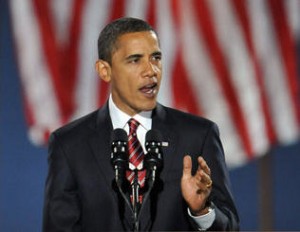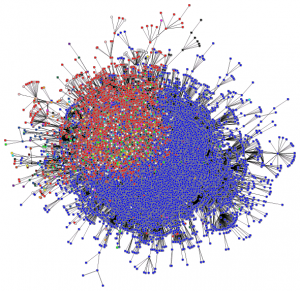The Independent’s mapping project, What Should Obama do Next? , is one of multiple initiatives appearing across the web linked to the Presidential inauguration of Barack Obama.
As Jimmy observed in his blog on the Huffington Post, mastery of internet campaigning is not the same as delivering government via the web. So it has been fascinating the observe the first edemocratic steps on Obama’s Change.gov site.
The Change.gov process so far has included blogging, YouTube insights and feedback (example below), threaded commenting, and the admirable step of opening up the content on the site via a Creative Commons license—and the volume and variety of the feedback on the discussions around health care (3,701 comments) and the economy (3,563 and counting) illustrate the potential and the challenges involved in processes of this kind.
Dan McSwain is right to note that "no other transition team has ever opened these types of channels of communication with the American people" and the team’s early energy, enthusiasm and willingness to experiment are praiseworthy; though, no doubt, like all start-up developers in public beta they’ll be attuned to thoughtful and constructive criticism as part of their process of continuous development.
Sustaining this openness to iterative experimentation will be one of the keys to fulfilling the transition team’s early promise beyond the inauguration. In part, this is because the capabilities of the web are evolving rapidly. YouTube and Twitter, for example, two of the most significant on-line tools used during the campaign, didn’t exist at the time of the last Presidential inauguration (and Twitter was only formally incorporated after Obama declared that he was running for office).
But, more fundamentally, it is because this openness to iterative and collaborative experimentation and improvement is one of the web’s deep lessons and, potentially, contains the means to transform our understanding and experience of governance.
Doc Searls refers to this wider emerging process as the "Live Web", and so, in his honour, we might characterise the opportunity ahead for the Obama transition team as being the chance to the effect significant shift towards "Live Government".
For the first time in modern industrial society, governments have the chance to realise the potential embodied in Bill Joy’s observation that there will always be more smart people outside government than within it…
And, in view of the scale and complexity of the challenges faced in the early 21st century, there has never been a more urgent time to realise this latent, distributed potential.
Live Government will take many forms that we can’t see clearly yet; however, two dimensions that seem central to the concept based on current trends are:
(1) Making the data of governance fluid, transparent, mashable and easily discoverable in context; getting the data in front of the people who have a contribution to make, and ensuring that the data is continuously up to date. This trend can be seen in the US in the form the Sunlight Foundation and the recent Apps for Democracy competition—both of which owe something to the pioneering work of the MySociety team in the UK.
(2) Externalising the current policy thinking of government in a open structured form to which people can contribute continuously, directly, precisely, cumulatively, and with a high signal-to-noise ratio. This trend, still comparatively nascent, can be seen in a prototypical form in policy wikis, annotation tools and sensemaking tools (of which Debategraph is an example).
It’s against this background that the latest development from the Obama transition team—in making all policy documents from official meetings with outside organizations publicly available for review and discussion on Change.gov—offers a tantalisingly encouraging sign.
As Dan McSwain, again, notes:
"…we’re inviting the American public to take a seat at the table and engage in a dialogue about these important issues and ideas—at the same time members of our team review these documents themselves."
It will be fascinating to see if the Obama transition team can carry this energised enthusiasm into office.

MAP UPDATE:
Thank you to everyone who has contributed to the development of the map over the last week, and to the people below for helping the map meme to circulate in the blogosphere:
Visual Mapping, Benchmarking e-gov, Tomorrow Happens, Heuristiquement, and @stoweboyd, @grisvert, @TheMindMapWatch, @jeanlucr
..and incidentally, henceforward, as well as the map email digests and RSS feed you’ll also be able to keep track of the latest developments on the map here http://twitter.com/TheIndyDebate.
Cross Posted from: Independent Minds.















